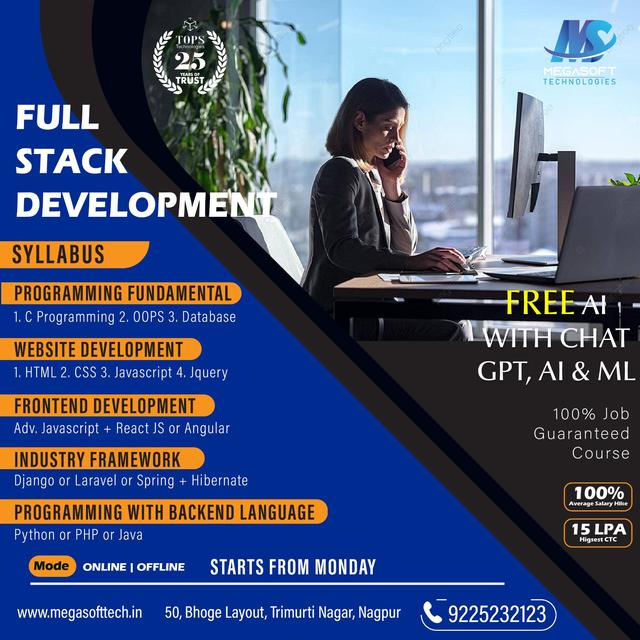All Full Stack , Data science , Data Analysis - Nagpur IT Training Institute
Duration:6 months
Batch Type:Weekend and Weekdays
Languages:English, Hindi, Marathi
Class Type:Online and Offline
Address:Gayatri Nagar, Nagpur
Course Fee:
Course Content
1. MERN Stack Development (MongoDB, Express.js, React, Node.js)
The MERN stack is a leading technology for building modern web applications. By focusing on a single language (JavaScript) across the entire stack, students can quickly become full-stack developers. This section of the curriculum will cover:
Frontend development with React.js for building dynamic and interactive user interfaces.
Backend development with Node.js and Express.js for building robust server-side applications and APIs.
Database management with MongoDB for storing and retrieving data efficiently.
Java Full-Stack Development
Java full-stack development is a popular and powerful approach for creating complex web applications. It leverages a single, versatile language, Java, across the entire application stack, allowing developers to build robust and scalable systems. This curriculum section would cover:
Frontend Development
HTML, CSS, and JavaScript: These are the foundational languages for building the visual and interactive parts of any web application. Students learn to structure content with HTML, style it with CSS, and add dynamic behavior with JavaScript.
Frontend Frameworks: Modern Java full-stack development often incorporates frameworks like React, Angular, or Vue.js to build dynamic and interactive user interfaces. These frameworks provide tools for managing application state, handling user input, and creating single-page applications (SPAs) that offer a smooth user experience.
Backend Development
Java and the Spring Framework: Java is the core language for the backend, and the Spring Framework is the most widely used tool for building enterprise-grade server-side applications. Students will learn to use Spring Boot to create standalone, production-ready applications with minimal configuration.
Building RESTful APIs: A key component of modern web development is building RESTful APIs (Representational State Transfer Application Programming Interfaces). These APIs act as the communication layer between the frontend and the backend, enabling data exchange in a standardized way.
Database Management
SQL and Relational Databases: Students will learn to use SQL (Structured Query Language) to interact with relational databases like MySQL or PostgreSQL. They'll also learn about database design, normalization, and optimization techniques.
NoSQL Databases: In addition to relational databases, an understanding of NoSQL databases like MongoDB is valuable for handling unstructured data. Students would learn when and how to use these databases effectively.
Object-Relational Mapping (ORM): To simplify database interactions, developers use ORM frameworks like Hibernate. This allows them to work with database records as if they were Java objects, reducing the need to write raw SQL queries.
Python Full-Stack Development
Python is an excellent and popular choice for building complete web applications. Because of its clear, readable code, it allows developers to quickly create everything from simple websites to complex web services. A curriculum focused on Python full-stack development would cover the following key areas:
Frontend Development
HTML, CSS, and JavaScript: These are the building blocks of the web and are essential for creating what the user sees and interacts with. You'll learn how to build the structure of a webpage with HTML, make it look good with CSS, and add interactive features with JavaScript.
Modern JavaScript Frameworks: While Python handles the server side, it's often paired with powerful JavaScript tools like React, Angular, or Vue.js to build the user interface. These frameworks help create fast, dynamic web applications that can update without needing to reload the entire page.
Backend Development
The Python Language: The core of the backend is Python itself. You'll learn how to write the logic that runs behind the scenes, such as handling user requests, managing data, and connecting to other services.
Web Frameworks: You'll work with popular Python web frameworks like Django or Flask. Django is a comprehensive framework that comes with many features built-in, making it a great choice for large, complex projects. Flask is a lighter, more flexible framework that's perfect for smaller applications or when you need more control over the project's structure.
Database Management
Relational and Non-Relational Databases: To store and organize your application's data, you'll learn about different types of databases. This includes relational databases like PostgreSQL or MySQL, which are good for structured data. You'll also learn about non-relational (NoSQL) databases like MongoDB, which are more flexible for unstructured or rapidly changing data.
Simplified Data Interaction: To make working with databases easier, you'll use tools called Object-Relational Mappers (ORMs) that allow you to manage data using simple Python code, so you don't have to write complex database commands.
Skills
C / C++ & Data Structures, C Programming, Cyber Security, Python Django, Full Python, Full Stack Development, Full Stack Java, Mobile Applications, Object Oriented Programming (c++, Java), Object Oriented Programming Using Java / C++, Oop in Java, Salesforce Cpq, Python Basics, C/c++ with Snippets of Embedded System Code, Salesforce Service Cloud, Java, Data Science, Data Analysis, Cloud Computing for Data Science (aws, Azure, Gcp), Java Programming, MERN Stack, MERN fullstack
Institute
.webp)
Nagpur IT Training Institute brings 15+ years of expertise in delivering high-quality technical education. The institute offers industry-focused programs in MERN Stack, Full Stack Java, Pyt...
4.7 Average Ratings
3 Reviews
15 Years Experience
Plot no 10/4, Gayatri nagar , IT Park, Near STPI
Students Rating
Sony
22-09-2025
Good teaching . Satisfied with the course .
Reethika
22-09-2025
A good course to learn java
View All





